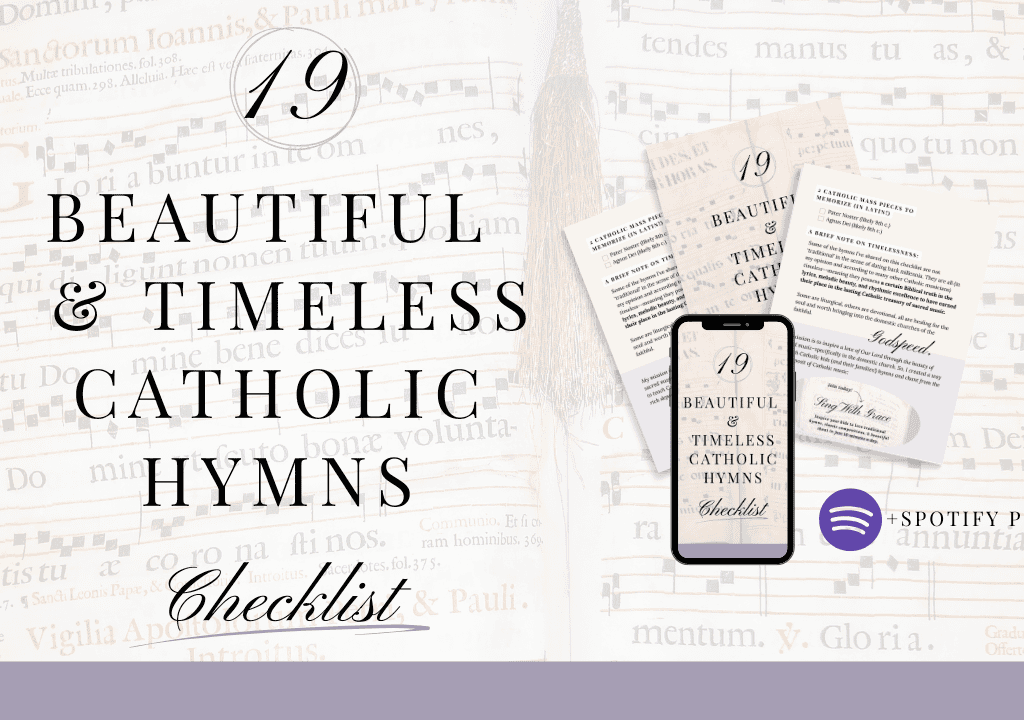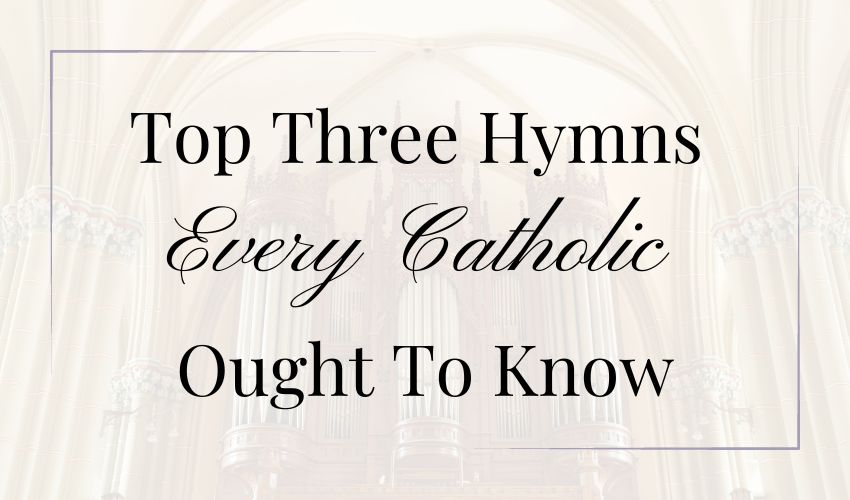Are you sick of Googling “traditional Catholic hymns” only to be met with semi-Christian songs (or worse, music with no legitimate moral messages?)
Since search engines don’t know what’s good for them or for you, I decided to compile this list of refreshingly traditional Catholic hymns to cleanse your auditory palette and enrich your soul with more pleasing and praiseful melodies!
Before we get to the top three hymns every Catholic should know, let me take a minute to share my brand new apostolate, Sing With Grace!
My mission is to inspire a love of Our Lord through the beauty of sacred music–specifically in the domestic church. So, I created a way to teach Catholic kids (and their families!) hymns and chant from the rich deposit of Catholic music.
Every month, I share timeless pieces and all you have to do is press play on the episode!
Let’s bring sacred music into your home!
May the Lord bless you and send you the beautiful Catholic music you need to hear in this season of your life!
Start Learning Sacred Catholic Pieces With These 3 Heavy Hitters
Let’s start it off with the Eucharistic Hymn, “Adoro te Devote.”
Written by Saint Thomas Aquinas in the 1260s, the saint and centuries of Catholics after him have used this hymn as a prayer in front of the Blessed Sacrament. A popular translation of the hymn, “Godhead Here in Hiding” has these lyrics for the first verse (original Latin to the left of the hymn is often sung!):
Adoro te devote, latens Deitas,
Quae sub his figuris vere latitas:
Tibi se cor meum totum subjicit,
Quia te contemplans totum deficit.
Godhead here in hiding whom I do adore
Masked by these bare shadows, shape and nothing more.
See, Lord, at thy service low lies here a heart
Lost, all lost in wonder at the God thou art.
In October of 2023, Sing With Grace families learned a more in-depth history of Adoro te Devote as well as a singalong version and professional recording by the Catholic men’s choir, Floriani. More information right here.
Adoro Te Devote can be sung year round and is especially perfect for the Liturgy of the Eucharist, Benediction of the Blessed Sacrament, and really any time a Catholic is in need of some consoling words.
Next hymn you ought to know: Salve Regina
Traditionally chanted at the end of compline and oftentimes at the Extraordinary Form of the Mass (Traditional Latin Mass), Salve Regina is one of the four seasonal Marian antiphons.
You might know the English prayer, “Hail Holy Queen.”
“The seasonal Marian antiphons are four beautiful and ancient prayers to the Blessed Virgin Mary. They are sung nightly following Compline. (Compline is Night Prayer of the Liturgy of the Hours. It’s obligatory for priests–and recommended for the rest of us.)
The Marian antiphons are “seasonal” because they shift according to the liturgical seasons of the year. From Advent through Candlemas (Feb. 2), Alma Redemptoris Mater is sung. From the day after Candlemas (Feb. 3) through the end of Lent, Ave Regina Coelorum. From Easter through Pentecost, Regina Coeli. After Pentecost (Ordinary Time), Salve Regina.” [1]
I highly recommend you read this entire post by William Bloomfield of One Peter Five linked below. He has INCREDIBLE insights into the importance of singing hymns and chant with your family:
“The four seasonal Marian antiphons are ideal Gregorian chants for all Catholics to learn. The melodies are simple; the texts are short; they don’t take long to sing; they can be learned one at a time as each new liturgical season commences; and both children and adults can easily learn to sing them by heart, i.e., without hymnals, music, or accompaniment. And let me stress the importance of learning these chants by heart. The chants should reside within you, where they will become part of you–and not just part of you personally, but also part of your family members, friends, and fellow parishioners. Not only does this give you something in common with all of these people, which is itself beneficial, it also allows for the singing of these chants at any time or place: in our homes, churches, and schools; in processions through our parish neighborhoods; and even abroad as we travel.”
Finally, a lovely hymn to the Holy Spirit: “Veni Creator Spiritus”
“Veni Creator Spiritus” (Come, Creator Spirit) is a traditional Christian hymn believed to have been written by Rabanus Maurus, a ninth-century German monk, teacher, archbishop, and saint. [2]
It’s perfect for the Solemnity of Pentecost as well as other occasions where we ask for the graces of the Holy Spirit (like conferences, RCIA, catechesis and more).
Veni Creator Spiritus,
Mentes tuorum visita,
Imple superna gratia,
Quae tu creasti pectora.
Qui Paraclitus diceris,
Donum Dei altissimi
Fons vivus, ignis, caritas,
Et spiritalis unctio.
Come, Holy Ghost, Creator blest,
Vouchsafe within our souls to rest;
Come with Thy grace and heav’nly aid
And fill the hearts which Thou hast made.
To Thee, the Comforter, we cry,
To Thee, the Gift of God Most High,
The Fount of life, the Fire of love,
The soul’s Anointing from above.
If you’re trying to incorporate more music into your Catholic home culture, try choosing one of these three traditional songs and singing it at a specific time of day! You’ll be surprised how quickly your family will learn this beautiful music.
Grab a curated list of all the Catholic hymns families should start singing.

If you found this list helpful and want it to reach more people, please consider sharing it to whatever socials you enjoy most: Instagram, Facebook groups, or Pinterest!
[1]: Four Marian Chants Every Catholic Should Know; One Peter Five
[2]: Wikipedia


